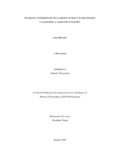
Please use this identifier to cite or link to this item:
https://hdl.handle.net/20.500.14301/506| Title: | Experiences of Learning Science in Secondary Classroom: A Narrative Inquiry. |
| Authors: | Bhandari, Amrit |
| Citation: | Bhandari,A. (2025). Experiences of learning science in secondary classroom: A narrative inquiry. |
| Issue Date: | Jan-2025 |
| Publisher: | Kathmandu University School of Education |
| School: | SOED |
| Department: | DOSE |
| Level: | M.Phil. |
| Program: | MPhil in STEAM Educaiton |
| Abstract: | As a student in Nepal, I studied science by memorizing terminology and formulae by heart, with little regard for their practical applications. Our educational system followed a traditional model. I prepared for tests, reviewed teachings, and followed the rules. I was still inquisitive and frequently questioned how science was related to daily life. Seeing my students struggle in the same ways motivated me as a teacher to establish a learning environment where knowledge and curiosity were valued over retaining information. To close the gap between conventional approaches and transformational learning methods, I am researching how Nepali students experience science learning. As a researcher and science teacher in Nepal, I began to learn about the experiences of secondary school students studying science in classrooms that were influenced by our country's distinct educational and cultural setting. I explored the experiences of six Grade 10 students using narrative inquiry, backed by the interpretivist and critical paradigm with socio-constructivist theory, to better understand how they deal with the possibilities and challenges of learning science. This study documents their voices as they move from rote memorization to meaningful and conceptual understanding through semi-structured interviews and theme analysis. The findings show that hardship, curiosity, and achievement interact dynamically. Students face numerous difficulties due to traditional teaching approaches that promote memorization over theory-practice connections. Nonetheless, the student narratives demonstrate the positive impacts of experiential learning, collaboration, and encouraging teachers. Experiments, field trips, and group discussions are all important ways to foster critical thinking and active engagement. These anecdotes highlight the shortcomings of outdated teaching strategies and demonstrate how contemporary, student-centered techniques like STEAM can enhance learning's relevance and engagement. Nepal's Science education should prioritize relating courses to real-life situations, promoting student involvement, and leveraging technology to prepare students for new challenges. Future studies should examine how combining digital technologies with regional cultural practices might help Nepal close the gap between rural and urban science education. |
| URI: | https://hdl.handle.net/20.500.14301/506 |
| Appears in Collections: | Dissertation |
Files in This Item:
| File | Description | Size | Format | |
|---|---|---|---|---|
| Amrit Bhandari FINAL Updated 17 May 2025.pdf | 1.38 MB | Adobe PDF |  View/Open |
Items in DSpace are protected by copyright, with all rights reserved, unless otherwise indicated.